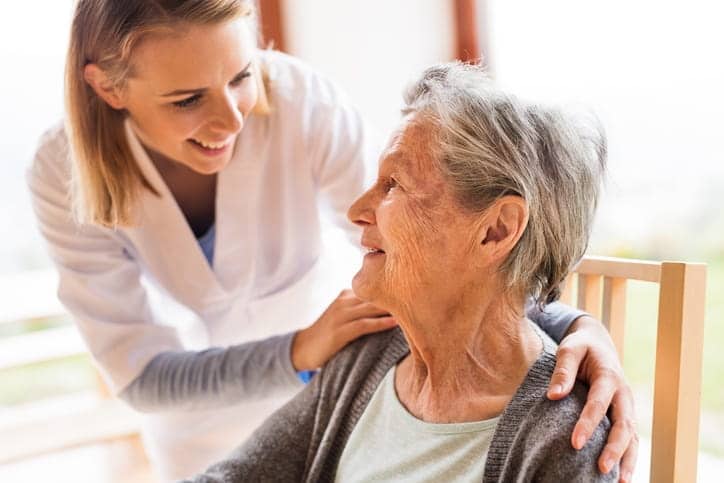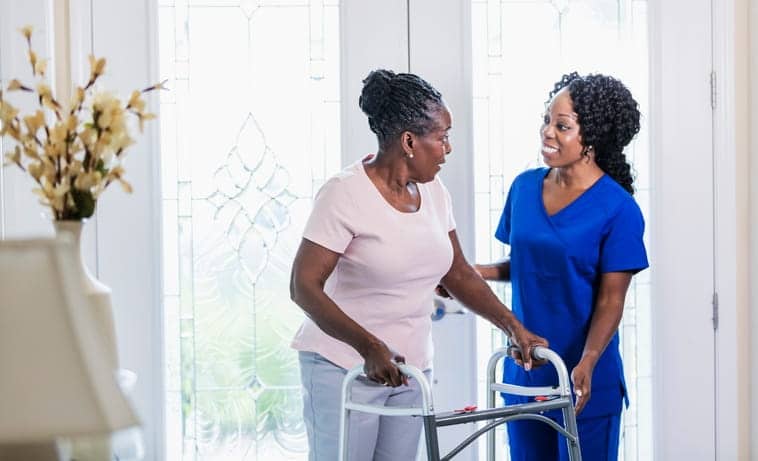As of 2020, almost 17% of the U.S. population was 65 or older, and the population is expected to continue aging steadily. Experts predict that by 2060, 23% of Americans will be 65 and older.

The aging population affects the U.S. economy and health care system, and there are individual considerations families must address as loved ones age. People’s necessities change as they age, and addressing senior needs can be challenging. Common questions about caring for elders include knowing when a senior needs extra care, how to meet elderly care needs, and how to help older people accept they need elder care.
Signs an elderly person may need help
You may have many elderly care questions and wonder how to know it’s time to consider moving an older loved one to an assisted living facility. People don’t need to move to a senior care facility just because they turned 65. Some seniors can live independently into their 70s and 80s, while others need care before they turn 65. Suppose you have a loved one diagnosed with early-onset Alzheimer’s who’s in their early 50s. They may need to move to a skilled nursing facility before they turn 60.
The following signs could indicate an older loved one may need extra care:
- A cluttered or messy home
- Confusion
- Falls
- Lack of hygiene
- Loneliness
- Medication mistakes
- Money management issues
- Motor skills issues
- Noticeable weight gain
- Noticeable weight loss
- Physical pain or weakness
Significant changes in an older person’s social, financial, and personal care routines can indicate they may need assistance.
What is an assessment of elder care needs?
Assessing senior care needs may involve several professionals, including:
- Nutritionists
- Occupational therapists
- Physicians
- Physical therapists
- Social workers
Suppose you think an elderly loved one may need extra care. In that case, you can pursue an assessment through your loved one’s primary care physician or a neurologist. The doctor may refer you to a geriatric assessment team or begin the evaluation.
A team assessment is valuable because it ensures you receive an evaluation of all aspects of your loved one’s well-being. Social workers will consider your loved one’s social interactions or if isolation is causing depression or other issues. Occupational therapists can determine if your loved one has the fine motor skills needed to dress and bathe independently. Physical therapists consider a person’s balance, strength, and coordination and can determine if they have a higher risk of falling. Nutritionists can determine if your loved one is malnourished.
A comprehensive expert assessment will confirm if your loved one needs extra care and what type of extra care they require.
How do you convince an older person that they need help?
Elderly persons may be reluctant to accept help because they fear the loss of control and don’t want to leave a familiar environment. You can alleviate these concerns by empowering your loved one to make as many decisions as possible.
Discuss your concerns and present options whenever you can. Perhaps your loved one is having issues with their eyesight and can’t drive. Consequently, they can’t play golf or visit with friends. You could address their isolation by offering to drive them to the golf course or hiring someone to transport them.
Your loved one doesn’t necessarily have to move out of their home if they need extra care. You may hire a personal care aide to look after household tasks and provide extra assistance.
Explain the issues and the options. Listen to your loved one and look for solutions they’re ready to accept that address their needs whenever possible. Your loved one will be more likely to accept help if they make informed choices about the assistance they accept.
What are some issues that should be considered when caring for the elderly?
There are multiple issues you should consider when making decisions about elder care, including the following:
- Are their needs affecting their social life? Elderly persons may struggle with depression and other mental health challenges if they’re isolated.
- Are there financial and legal issues related to their needs? You may need to become your loved one’s official guardian, health care agent, or legal representative so you can make decisions for their care.
- Are there safety issues stemming from their needs? People with balance issues and weakness are more likely to hurt themselves by falling.
- Do they need help with daily living activities? Someone struggling to change clothes or bathe may stop bathing, leading to poor hygiene and related health issues.
- Does a cognitive impairment affect their ability to make informed decisions? People with cognitive issues may wander and get lost. Some also experience behavioral issues, which can pose a safety risk to those trying to provide care.
- Will they be able to see family and friends? Moving someone far from family members and friends can make the transition to an assisted living or skilled nursing facility less appealing. Consider options that allow your loved one to maintain current relationships.
How skilled nursing facilities can help

Skilled nursing facilities offer the practical and medical resources the elderly need to thrive in their golden years. In addition to home-assisted living accommodations, skilled nursing facilities provide residents with medical services, such as occupational and physical therapy. Your loved one can receive the essential practical and medical care they need in their new home and benefit from new friendships with other residents.
Contact Haven Health to learn how we can help meet your loved one’s senior care needs.
Sources:
Caplan, Z. (2023). U.S. Older Population Grew From 2010 to 2020 at Fastest Rate Since 1880 to 1890.
Grueling, H.K. 2016. Combatting Senior Malnutrition.
Mather, M. et al. (2019). Fact Sheet: Aging in the United States.